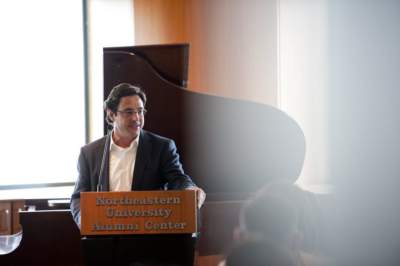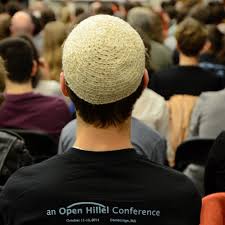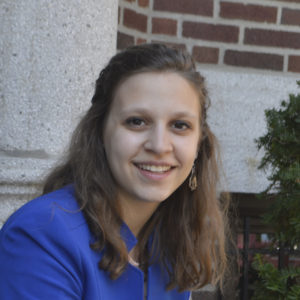This is part 1 in a 3-part series about politics, identity, and Jewish community on college campuses. Click here to view part 2, and here to view part 3.
On the eve of Rosh Hashanah in 2015, a new wave of violence arose in Israel. Often referred to as the “stabbing intifada,” it led to both Palestinian and Israeli deaths.
A world away, the American Jewish community was watching. Brooke Davies was beginning her junior year at the University of North Carolina, Chapel Hill. The local Students for Justice in Palestine organization was holding a vigil for the Palestinian victims who had died in the attacks. In solidarity as the chair of the local J Street U chapter, a pro-Israel, pro-Palestinian political organization, Davies decided to attend. She marked “Going” on Facebook.
Five minutes later, she received a message from her Hillel director, Ari Gauss. It was a summons to his office. He told her members of the organization’s donor board saw her Facebook response to the event and were unhappy. He did not ask her to refrain from attending the vigil, but instead, to change her Facebook status to “Not Going.”
“That was jarring to me because it felt so stupid — it felt like such a waste of time,” said Davies, who graduated from UNC in 2017. “It is a waste of my Hillel director’s time to have to sit me down and tell me that because I clicked a button on Facebook, that he is in trouble. It was also a waste of my time and a waste of J Street U’s time. We shouldn’t have engaged in this back and forth between what I can and cannot do on Facebook.”
UNC isn’t the only campus dealing with tension between Jewish students and Hillel, an international organization with local affiliates whose mission is to create community for Jewish college students. Across the country, issues of faith, identity, Israel-Palestine politics, and diversity of programming have been driving apart campus Jewish communities, leading students to form independent organizations or leave campus Jewish life entirely.

Northeastern University professor Dov Waxman, who teaches political science, international affairs, and Israel studies, has investigated the politics of American Jewish communities for years. He’s the author of the 2016 book “Trouble in the Tribe: The American Jewish Conflict Over Israel.”
“There’s definitely a sense that Hillel is no longer a place as it once was where Jews of diverse political opinions — whether they’re staunchly Zionist, a critical Zionist, or not Zionist at all — felt comfortable,” Waxman said. “That’s something you hear time and again among young people: just feeling like they don’t belong there if they don’t have this right set of views.”
Davies soon learned the troubles with Hillel weren’t unique to UNC when she became J Street U’s national student president in 2016. It helped her evaluate her own experiences on campus, too. She said her relationship with Gauss had been strong, but she also knows he deals with a lot of pressure from donors, who want to see things happen a certain way.
“It had nothing to do with my Hillel director, who has tried time and time again to walk this really hard balance between his stakeholders and his values and his students,” Davies said.
Gauss, reached by email in August, said although he does not remember this conversation, he does not allow a donor’s politics to influence student programming or experiences.
“Hillel would never try to prevent students from participating in any program, on or off campus,” Gauss said in the Aug. 6 email. “In my 9-plus years as executive director of NC Hillel, we have never allowed a donor’s politics to dictate our decision-making about sponsoring specific programs or events. We are proud to have always had an appropriately broad tent.”
Across the political spectrum, a pro-Israel advocacy group at the University of Central Florida (UCF) has also struggled to find a way to engage with their local Hillel.

“If you’re a Hillel organization, you don’t have this autonomy, you don’t have the rights and privileges to do as you please,” said senior Jake Suster, the former president of Knights for Israel (KFI), the pro-Israel group at UCF. “You have to go through a middleman, to this third person, and make sure you’re following their rules and their guidelines.”
Suster remembers one incident very clearly. In 2016, students heard rumors that Students for Justice in Palestine (SJP) was planning an Apartheid Wall during Israel Apartheid Week. In response, Knights for Israel wanted to emulate a situation that took place at Columbia University earlier that year: install a 15-foot-tall Pinocchio blow-up doll in front of the wall.
Hillel was against the idea, Suster said, because they worried about making a scene. Staff allegedly convinced a Hillel student to voice opposition in the Knights for Israel private Facebook group. According to Suster, that student later said he regretted it.
Aaron Weil, the executive director and CEO of Central Florida Hillel, remembers this time of tension in 2016. He said although Hillel staff and KFI students were ideologically aligned, their methods of communicating to the student body were different.
“We felt that putting something as photogenic as a massive Pinocchio next to their wall … the optics of that photograph would have been a gift to SJP,” Weil said. “Go over and have conversations with them. That will get more done than providing them with an opportunity to get more exposure in the newspaper.”
Weil said he remembers discussing the issue at a public meeting, where KFI decided not to go through with the Pinocchio plan. Suster and Weil both said the relationship began to get better, as new leadership at both Hillel and KFI put past issues behind them. Weil also said he understands why KFI had been so resistant to Hillel’s input — as an independent organization, they wanted their freedom. Now, though, he’s happy they can work together toward a shared goal.
Regardless, this time in Suster’s undergraduate experience sticks in his mind. He said he always felt KFI’s problems on campus came from the Hillel staff — not from left-wing groups or Israel Apartheid Week. He hopes it changes.
“They shouldn’t interfere with our job,” Suster said. “It felt like our biggest competition, because of scheduling, was our Hillel — not SJP. That was just so ironic.”
Hillel standards on Israel stifle campuses
Some students routinely battle their Hillels on their unwillingness to discuss the occupation or other related social justice causes. Sometimes, that struggle stems specifically from Hillel’s Israel Guidelines and Standards of Partnership. The guidelines stipulate that local Hillels should support inquiry around Israel but refrain from partnering with certain organizations or individuals who may, according to Hillel, be anti-Israel.
The guidelines, enacted in 2010, forbid partnership with organizations or individuals who “delegitimize, demonize, or apply a double standard to Israel; support boycott of, divestment from, or sanctions against the State of Israel; exhibit a pattern of disruptive behavior toward campus events or guest speakers or foster an atmosphere of incivility.”
In 2012, Harvard University students organized after their Hillel refused to host an event between a progressive Jewish student group and a Palestinian one. Within two years, four campuses — Swarthmore College, Vassar College, Guilford College, and Wesleyan University — passed resolutions condemning the Standards and refusing to follow them. These Jewish communities became “Open Hillels” and sparked a national movement. Since then, Open Hillel has held conferences and events asking Hillel International to rescind the rules and facilitate open dialogue in campus Jewish communities.

Waxman, who sits on Open Hillel’s Academic Council, said the basic explanation for the Standards was to ensure that local Hillels would not partner with organizations or individuals who supported the boycott, divestment, sanctions movement (BDS). But, they’ve morphed into something different.
“If you say Israel should entirely withdraw from the West Bank and not occupy any Palestinian territory in the West Bank, is that challenging ‘Israel’s right to exist within secure borders?’ No,” Waxman said, quoting the Standards. “These guidelines — the ambiguity in them — means they are very subject to different interpretations and, I think, abuse.”
Matt Berger, Hillel International’s vice president of communications, said in an Aug. 24 email that Hillel reserves the right to “respectfully decline to host or support a program” that doesn’t fit the organization’s pro-Israel values. He also reiterated Hillel’s mission to build Jewish identity on campus, including strengthening Jewish students’ connection to Israel.
These rules have caused a lot of pain on campuses where the Jewish community boasts a wide diversity of opinion about the Israeli-Palestinian conflict, including Tufts University in Medford, Massachusetts. There, a group of students formed an organization called AltJ, or Alternative Jewish Community, to provide a space for students who were uncomfortable with Hillel. 2017 graduate Noah Habeeb was one of them.
“Hillel billed itself as the center for Jewish life on campus, and at that time, was the Jewish life on campus,” Habeeb said. “We felt like it wasn’t possible for us to be Jewish in the way we wanted to be on campus, so we started AltJ as a non-antagonistic alternative to Hillel.”
Habeeb said anyone is welcome in AltJ, where members host potluck Shabbat dinners and holidays at people’s homes. He says there are a number of reasons why AltJ exists.
“Folks who come to it are a combination of people who don’t feel comfortable in Hillel because of their Israel politics, don’t feel comfortable in Hillel because they’re questioning their Israel politics, people who just don’t like institutional Jewish places, people who are lower-income,” Habeeb said.
Regardless, Habeeb has tried to partner with Hillel on community events. There’s one specific experience that sticks out in his mind. He suggested, in 2017, to bring three Jewish individuals to campus who worked to register African-Americans to vote during the 1964 Freedom Summer in Mississippi.
“I suggested they could come speak, not about Israel, about growing up Jewish in Brooklyn and going to Mississippi to do racial justice organizing,” Habeeb said. “[Hillel] said it wasn’t doable because of [the speakers’] Israel politics, even though that wasn’t something they were going to be talking about.”
Hillel’s decision came because of the Standards of Partnership, according to Sara Legasey, who was the Birthright coordinator at Tufts Hillel at the time. Legasey, who is now working part-time at Hillel on an Israeli-Palestinian coexistence initiative, said the speakers were visiting Hillels across the country with the intent of breaking the Standards.
“We weren’t interested in being a pawn in that,” Legasey said.
A representative from Open Hillel confirmed the organization was assisting students in bringing these speakers to Hillels.
Legasey said she and the staff understand the Hillel community is not perfect. While she values a pluralistic community, she also knows how difficult it can be to create something that works for everyone.
“If someone’s Jewish identity is such they cannot feel safe, ever, in a space that is also welcoming to Zionism, then unfortunately they may not feel comfortable in Hillel,” Legasey said. “That’s one of the challenges we’re still trying to navigate, find a way around: How do you make a space that is comfortable and welcoming to everyone? I think it’s clear we haven’t exactly solved that yet, but we’re trying to figure it out.”
Communities struggle for political pluralism
In 2017, President Donald J. Trump nominated Kenneth Marcus, an attorney and academic, to serve as the assistant secretary for civil rights in the U.S. Department of Education. Soon after, Eric Fingerhut, the president and CEO of Hillel International, submitted a letter to the Senate hearing committee, endorsing Marcus for his work against anti-Semitism on college campuses.
Jewish students on campuses across the country were furious, for more than one reason. Some were upset about Marcus’ one-sided stance on Israel. Others were angry about his support of the secretary of education’s rollback of Obama-era policies around campus sexual assault.
The issue was particularly angering for Jeremy Voss, a junior at the University of Washington in Seattle and one of the local J Street U leaders. Voss held a meeting between students and staff to discuss the nomination after learning that multiple staff members did oppose Marcus. But while they were against the nomination, they would not come forward or release a statement for fear of losing their jobs.
“We were meeting behind closed doors and talking to people and being like, ‘What would it look like if [our] Hillel actually released a statement?’ and we just hit a brick wall,” Voss said about the meeting held between students and staff. “As liberal and progressive and anti-Kenneth Marcus as these people were, they were like, ‘We can’t release a statement that would go against Eric Fingerhut, because then Hillel at UW would be dismantled.”
Voss declined to name the staff members to protect their positions at Hillel but said the reasons they couldn’t release a statement were justified, yet frustrating. When Swarthmore and Guilford Colleges became Open Hillel schools after rejecting Hillel International’s Standards of Partnership, the parent organization threatened to sue Swarthmore if they didn’t change their name or retract their statements.
At Smith College in Northampton Massachusetts, there is no Hillel at all. Instead, a registered student organization called the Smith College Jewish Community functions in a similar role. Rabbi Rhonda Shapiro-Rieser, Smith’s part-time rabbi, often worries that some students don’t feel comfortable in the Jewish community because of Israeli-Palestinian politics.
Rieser said she believes her role on campus is to facilitate a pluralistic space, not pressure her students to do programming a certain way. She keeps her politics to herself, she said, and that’s intentional.
“I will help organize the Zionist group on campus and I will sign on as an adviser so the students going to JVP [Jewish Voice for Peace] can go to a conference,” Rieser said. “My view of what I do as a Jewish student advisor is to create a space where the doors are open for all Jews.”
Habeeb, from AltJ at Tufts, said instead of wishing for Hillel to be an apolitical space, he wants it to be a space where everyone’s political beliefs can find a home.
“Politics are unavoidable. Politics and faith, and politics and Jewish values are inseparable in many ways,” Habeeb said. “But I think [Hillel] can be a space of multiple truths, and a plurality of Jewish perspectives — a space for all people to engage in Judaism in time with political issues.”
Davies, the Chapel Hill alumna, sees it much the same way. She points out that Hillel’s very name comes from a revered Jewish scholar, Hillel the Elder, known for his constant debates and questions about Judaism.
“As much as I would like Hillel to be an apolitical, wonderful place, I think it’s encoded into our DNA as Jews and as Hillel to argue and get into these debates because I think it’s who we are,” Davies said. “That is at the core of my Judaism — the idea that I am among a group of people who do the hard things and ask the hard questions and pray with their feet.”
Hannah Bernstein is a student at Northeastern University and a New Voices reporting fellow.
Editor’s note: Hannah Bernstein attended Hillel International’s Engagement Institute in August 2017. She began working on this story in May 2017.
Photo credit for featured image: Pixabay.com.

